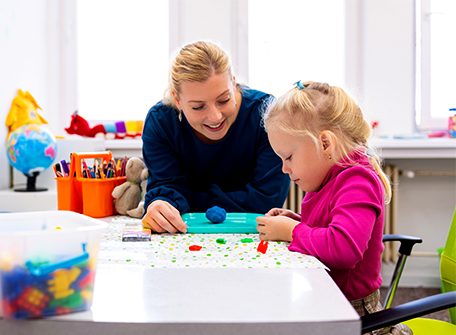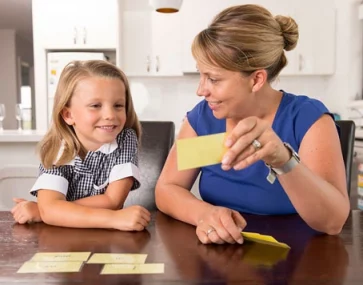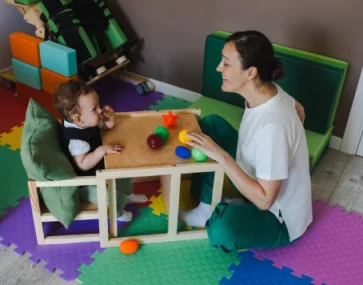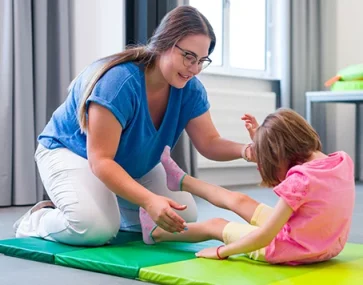Occupational therapy (OT) can help children with ADHD by providing strategies and techniques to improve their attention, focus, organization, and self-regulation. OT can help children to better manage their impulsivity, increase their ability to self-monitor, and develop better coping skills. Additionally, OT can help children with ADHD to improve their fine motor skills, sensory processing, and social skills, which can help them to better engage in tasks and activities. OT can also help children to improve their time management skills and develop better organizational strategies to help them complete tasks and assignments.
An occupational therapist can work with a child with ADHD to develop an individualized program to help the child better manage their symptoms, improve their skills, and increase their quality of life.
Hope AMC treats many kids with ADHD in its clinic in Dubai. By working with parents and teachers, we give kids with ADHD strategies that will help them cope with their everyday life.
The Following Are Some Of The Things We Do To Help Children With Adhd:
- Planning and Organization
- Difficulty processing sensory information
- Self-regulation skills development
- Facilitate participation in everyday activities
- Teach self-regulation strategies
- Improve attention and focus
- Promote sensory integration
- Build confidence and self-esteem
To find out more about how we can help your child, let’s take a closer look at these eight areas.
1. Planning and Organization
By breaking tasks down into small, achievable steps, we help children reach their goals. As a result, they will not feel overwhelmed by the task and will know where to begin. It could be something as simple as managing daily homework, doing an assignment, or organizing their schedule. Children with ADHD benefit most from visual information. It may be helpful to use visual charts, post-it, color coding, and/or checklists.
2. Difficulty Processing Sensory Information
A study found that 40% of children with ADHD also have Sensory Processing Disorder. It is possible for children with sensory processing disorder (SPD) to over- or under-react to sensory information; to fail to interpret sensory information accurately; or to experience sensory-based motor disorders.
We aim to develop appropriate responses to sensation in active, purposeful and fun ways so children can carry out everyday activities at home and school. In addition, we provide strategies for parents to help manage their children’s behavior at home, and for teachers to help manage a child’s behavior in the classroom. You can recommend ‘seamless socks’, heavy work activities, calm down areas at school or use a Movin’ Sit cushion to sit on these things.
3. Self-Regulation Skills Development
The ability to regulate one’s feelings and behaviors is self-regulation. Children who have poor self-regulation may have a meltdown over a seemingly insignificant issue, such as being told to stop playing with their favorite toy.
4. Facilitate Participation In Everyday Activities
Occupational therapists can help your child become more independent and better able to manage their day-to-day tasks. This could include improving fine motor skills, learning how to use adaptive equipment, or improving their ability to self-regulate their emotions and behaviors.
5. Teach Self-Regulation Strategies
Occupational therapists can help your child to learn self-regulation strategies, such as deep breathing, relaxation techniques, and positive self-talk. These strategies can help your child to better manage their symptoms of ADHD and make positive choices.
6. Improve Attention And Focus
Occupational therapists can help your child to develop the skills to maintain focus and stay on task. This includes developing organizational strategies and providing individualized instruction to improve memory, attention, and executive functioning skills.
7. Promote Sensory Integration
Occupational therapists can help your child to gain an understanding of their sensory needs. This could include providing sensory input to help your child stay alert and focused, or providing relaxation strategies to help them calm down.
8. Build Confidence And Self-Esteem
Occupational therapists can help your child to build a sense of self-confidence and self-esteem. This could include helping your child to develop social skills, set goals, and recognize their positive qualities.
Occupational Therapy At Hope Amc: Why Should You Choose Us?
Children play, learn, develop, and grow! Occupational therapy for kids is what Hope AMC does best! In addition to treating physical, emotional, behavioral, social, and motor skill development, we have licensed occupational therapists on staff. Personalized treatment plans are available at Hope AMC, where we believe that “One Size Does Not Fit All”. Your child’s occupational therapist devises a therapy plan after understanding why they struggle to perform specific tasks.
Our goal is to help your child achieve maximum potential and independence in all aspects of daily life. To help children develop the necessary skills to perform tasks, our occupational therapists use creative methods and play-based activities. Boosting self-confidence among children is accomplished both one-on-one and in groups. Additionally, we encourage parents’ participation during therapy sessions and teach them how to implement those techniques at home by using specific tools.
Feel free to contact Hope AMC for a consultation if you are searching for “occupational therapy clinics near me”!






